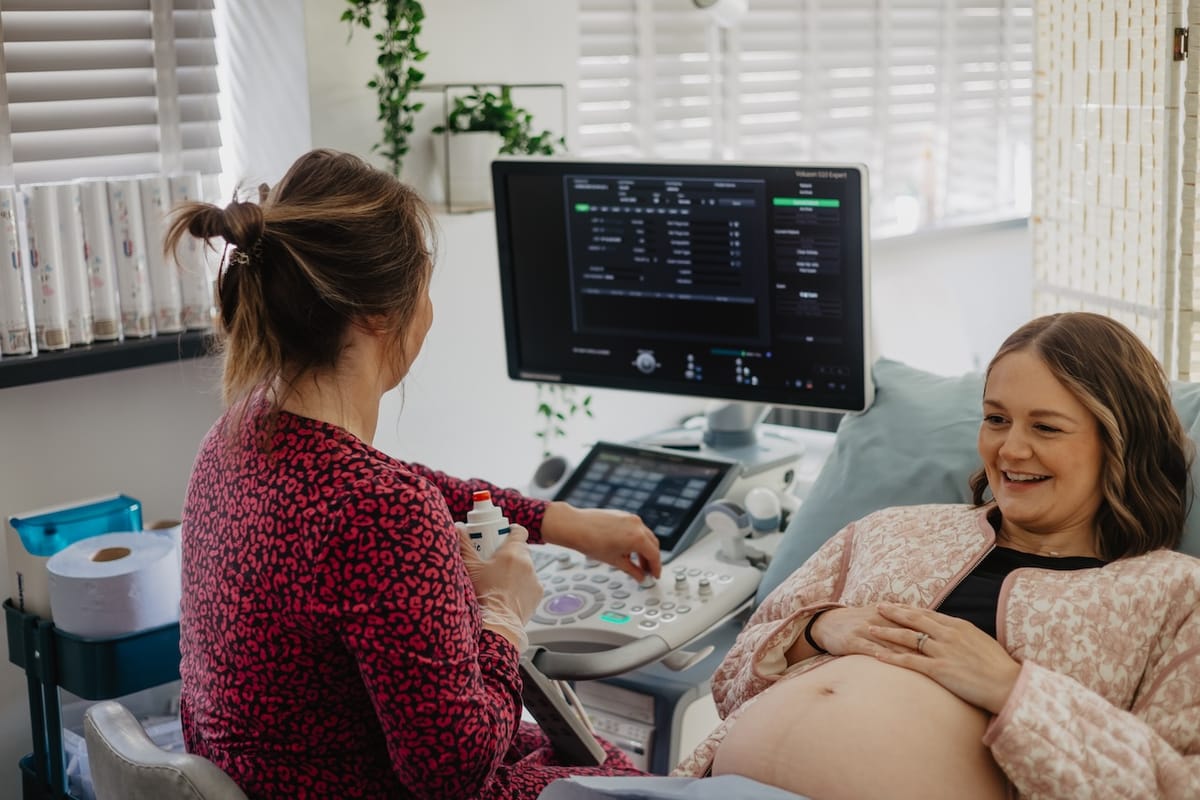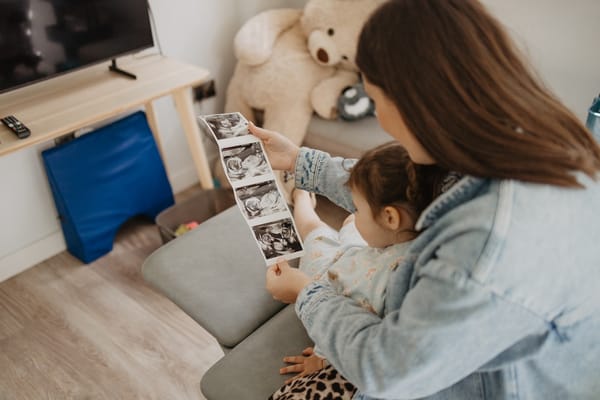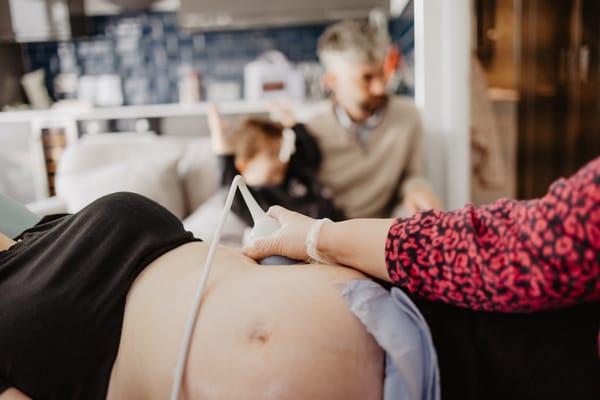How Early Can You Have a Pregnancy Scan?

By Maria Birch, UK-Registered Obstetric Sonographer
Last updated: 2nd July 2025.
If you’ve just had a positive pregnancy test, you might be asking:
“How soon can I get an ultrasound to confirm everything is okay?”
It’s one of the most common questions I’m asked at Sneak-A-Peek Ultrasound. And while there’s no one-size-fits-all answer, here’s the good news:
With the right equipment and experienced care, you can have a viability scan as early as 6 weeks—and sometimes even sooner.
What Is an Early Pregnancy Scan?
An early pregnancy scan (sometimes called a viability scan or dating scan) is an ultrasound performed before your routine 12-week NHS scan. It’s often done privately for reassurance, or offered by the NHS if there are concerning symptoms like pain or bleeding.
In a healthy pregnancy, an early scan can:
- Confirm your baby’s heartbeat
- Check the location of your pregnancy (to rule out ectopic pregnancy)
- Estimate how far along you are
- Show whether you’re carrying one baby or more
How Early Can You See a Baby on Ultrasound?
Most private clinics can detect a pregnancy from 6 weeks gestation, measured from the first day of your last period.
But there are a few important caveats:
- At 6 weeks, your baby is about the size of a lentil. You may need a transvaginal scan for clear images.
- If your dates are slightly off (which is common), the scan might be too early to show a heartbeat.
- If your scan is inconclusive, you may be asked to come back in 1–2 weeks—adding more uncertainty rather than reassurance.
For the most accurate results and least anxiety, I recommend booking between 7–8 weeks, especially if you’re unsure of your cycle length or ovulation date.
Why Do Some Women Choose an Early Scan?
Most early pregnancy scans are booked privately. Reasons include:
- Peace of mind after previous miscarriage or loss
- Confirming viability before sharing news with family
- Reducing anxiety during the long wait to the 12-week scan
- Checking for twins (or more)
If you’re unsure when to book your scans throughout pregnancy, download Your Pregnancy Scan Timeline—a visual PDF that explains what each scan shows, when to book it, and why it matters.
What If I’m Having Pain or Bleeding?
If you have symptoms like:
- Severe lower abdominal pain
- Heavy bleeding
- Dizziness or fainting
Contact your GP, midwife, or 111 (UK) immediately. These may be signs of ectopic pregnancy or miscarriage.
In urgent cases, you’ll be referred to your local Early Pregnancy Assessment Unit (EPAU) for a scan, usually within 24–48 hours. Private scans are not suitable for emergency assessment.
What Does an Early Pregnancy Scan Show?
Here’s what we can typically see, depending on gestation:
|
Week |
What You Might See |
|---|---|
|
5 weeks |
Gestational sac (may be visible, no heartbeat yet) |
|
6 weeks |
Yolk sac, early fetal pole, flickering heartbeat |
|
7–8 weeks |
Clear fetal pole, strong heartbeat, embryo measurement |
|
9–11 weeks |
Limb buds, head, early movements, and more detail |
Keep in mind: early scans cannot check your baby’s organs or brain development. These are assessed later, typically at the 20-week anomaly scan.
How Is an Early Scan Performed?
Most early scans are done transvaginally (internal), especially before 8–9 weeks. This gives clearer images than abdominal scans when your baby is still tiny.
At Sneak-A-Peek, I use high-resolution ultrasound equipment and follow a 7-point wellbeing assessment refined over 10+ years in both NHS and private practice.
Is It Safe to Have an Early Ultrasound?
Yes. Ultrasound uses sound waves, not radiation, and has been used safely in pregnancy for decades.
What matters most is that scans are performed:
- By a qualified sonographer
- With medical-grade equipment
- For a clear clinical or emotional purpose
Early reassurance scans are considered safe when done responsibly. You can read more in Are Extra Ultrasounds Safe?
When Should You Wait to Book?
You may want to delay your scan until at least 8 weeks if:
- You’re unsure of your dates
- You’d prefer to avoid a transvaginal scan
- You’d rather not risk needing a repeat scan if baby is too small to be seen
Waiting just a week or two longer often brings more clarity and less stress.
FAQs About Early Pregnancy Scans
Can I have a scan before 6 weeks?
Technically yes, but it’s rarely helpful. Most early signs of pregnancy aren’t clearly visible on ultrasound before 6 weeks.
Will I definitely see a heartbeat at 6 weeks?
Not always. Even if your pregnancy is healthy, the heartbeat might not be detectable until closer to 6.5–7 weeks—especially if your dates are slightly off.
What if nothing is seen on the scan?
It could mean one of two things: you’re earlier than you thought, or you’ve had a miscarriage. In either case, you’ll be referred to NHS care for repeat scans and blood tests.
Is it safe to have more than one early scan?
Yes, as long as scans are medically justified or performed for emotional reassurance by qualified professionals. Learn more in How Many Ultrasounds Do You Need in a Healthy Pregnancy?
Final Thoughts: Early Scan, Early Reassurance
An early pregnancy scan can offer comfort, clarity, and connection—especially if you’re navigating pregnancy after loss, IVF, or just feeling unsure.
But timing matters. To avoid worry from an inconclusive result, make sure:
- You’re confident in your dates, or
- You’re past 7 weeks, or
- You’ve spoken to your sonographer before booking
At Sneak-A-Peek, I always want your scan to bring reassurance, not confusion. And if you’d like help understanding what each scan can (and can’t) show, grab the free guide on our sister site, The Scan Lady:





